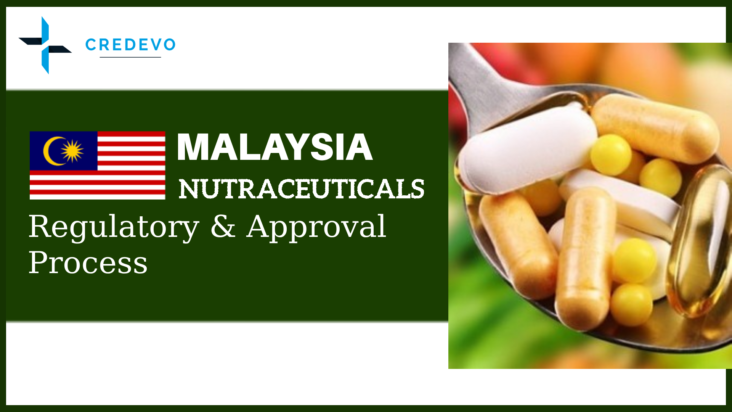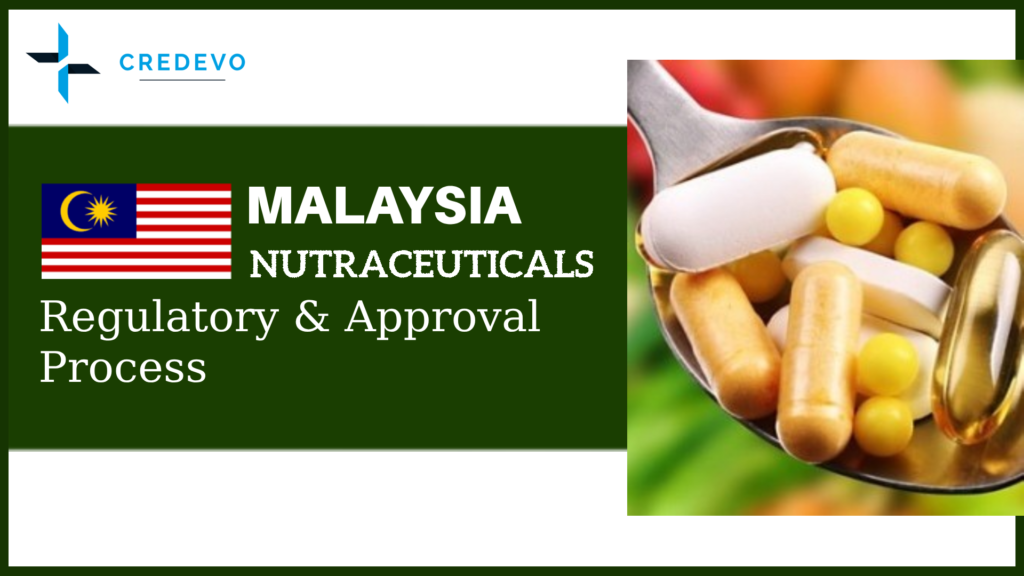Nutraceutical Regulatory & Approval Process In Malaysia

The nutraceutical registration and approval process in Malaysia is straightforward, yet one needs to be familiar with the required documents and the registration procedure for their products. The Malaysian market appears highly promising for nutraceutical and food supplement products. In Malaysia, the production and consumption of Halal nutraceutical products align with the country’s strong emphasis on Halal practices, given its predominantly Muslim population.

Before delving into a discussion about the registration process in Malaysia, let’s first understand the Malaysian market for nutraceutical products.
Top 10 advantages in registering nutraceutical products in Malaysia
- Growing Health and Wellness Awareness: Malaysian consumers have a growing awareness of health and wellness. The interest in preventive healthcare and dietary supplements aligns well with the nutraceutical industry.
- Diverse Population: Malaysia has a diverse population with different cultural and dietary preferences. This diversity creates opportunities for various nutraceutical products tailored to various consumer needs.
- Government Support and Regulation: The Malaysian government, through agencies like the National Pharmaceutical Regulatory Agency (NPRA), regulates and ensures the safety and quality of nutraceutical products. A clear regulatory framework can provide a level playing field for businesses.
- Strategic Location: Malaysia’s strategic location in Southeast Asia makes it a potential hub for reaching other markets in the region. Businesses can leverage Malaysia as a gateway to tap into the broader ASEAN market.
- Infrastructure and Distribution Networks: Malaysia has well-developed infrastructure and distribution networks, facilitating the efficient movement of goods. This can be advantageous for product distribution and market accessibility.
- Consumer Trust in International Brands: Malaysian consumers often have trust in international brands, and this can be an advantage for foreign nutraceutical companies entering the market.
- Increasing Affluence and Urbanization: Rising affluence and urbanization in Malaysia contribute to changes in lifestyle and dietary patterns. Consumers may seek nutraceutical products to support their health and well-being in these evolving environments.
- Economic Stability: Malaysia has maintained economic stability over the years, which can create a conducive environment for business growth and investment.
- Tourism Opportunities: Malaysia is a popular tourist destination, and the tourism industry can create opportunities for the sale of nutraceutical products to visitors seeking health and wellness solutions.
- Cultural Diversity in Cuisine: The diverse culinary landscape in Malaysia may open opportunities for nutraceutical products that complement various dietary habits and preferences.
Regulatory for nutraceutical products in Malaysia
Regulatory authority in Malaysia
In Malaysia, the regulatory authority responsible for the registration and control of nutraceutical products is the National Pharmaceutical Regulatory Agency (NPRA), which operates under the Ministry of Health (MOH). The NPRA ensures that these products comply with the relevant regulations and standards to ensure safety, quality, and efficacy.
Local representative service
For nutraceutical products, it is common in many countries, including Malaysia, to have a local representative or distributor who can assist with the regulatory processes, communication with authorities, and compliance with local laws. This local representative can also play a crucial role in post-market surveillance and liaising with regulatory authorities on behalf of the foreign manufacturer.
Definition of nutraceutical products
A Health Supplement (HS) is any product that is used to supplement a diet and to maintain, enhance, and improve the health function of the human body. It is presented in small unit dosage forms (to be administered) such as capsules, tablets, powder, and liquids and shall not include any sterile preparations (i.e. injectable, eyedrops). It may contain one or more, of the following combinations:
Vitamins, minerals, amino acids, fatty acids, enzymes, probiotics, and other bioactive substances;
Substances derived from *natural sources, including animal, mineral, and botanical materials in the forms of extracts, isolates, concentrates, and metabolite;
Synthetic sources of ingredients mentioned in (i) and (ii) may only be used where the safety of these has been proven.
Classification
The specific classification may depend on the nature of the product and its intended use. Here is a brief overview:
Food
Nutraceutical products that are formulated and marketed primarily as food items fall under this category. These products often include functional foods and beverages that provide health benefits beyond basic nutrition. The regulation of such products is overseen by the Malaysian Food Act and its associated regulations.
Dietary Supplements:
Nutraceuticals that are formulated to supplement the diet with additional nutrients or bioactive compounds may be classified as dietary supplements. This category includes vitamins, minerals, herbal extracts, and other nutritional supplements. The regulatory framework for dietary supplements is typically governed by the Malaysian National Pharmaceutical Regulatory Agency (NPRA) under the Ministry of Health.
Traditional Medicines:
Some nutraceutical products may be categorized as traditional medicines, especially if they have historical use or are derived from traditional remedies. The classification as a traditional medicine may involve a separate set of regulations overseen by the Traditional and Complementary Medicine Division of the Ministry of Health.
What are the requirements to register nutraceutical products?
The submission process may vary depending on the extent of claims, following the outlined routes:
- For General/Nutritional and Medium Claims, an abridged evaluation will be conducted.
- Disease Risk Reduction Claims will undergo a full evaluation.
The following documents will have to be provided during the submission of the product dossier for the Sustained-release/ Extended-release/ Timed-release dosage form
- GMP Certificate
- Safety, efficacy, and quality control measures.
- In-Process Quality Control (IPQC);
- Finished Product Specification (FPQC);
- Certificate of Analysis (COA) and other documents depending on the product.
The process of registering nutraceutical products
Preparation of Documentation:
- Gather all necessary documentation related to the nutraceutical product, including information on its composition, manufacturing processes, safety data, and labeling.
- Ensure that the product complies with relevant regulations and standards.
Appointment of a Local Representative:
Consider appointing a local representative or distributor in Malaysia to assist with regulatory processes and communication with authorities.
Submission of Application:
- Apply for product registration to the NPRA.
- Include all required documentation and information.
Evaluation Process:
- The NPRA will review the submitted documentation to assess the nutraceutical product’s safety, quality, and efficacy.
- Different evaluation processes may apply based on the type of claims associated with the product.
Abridged or Full Evaluation:
- Abridged evaluation may apply for general/nutritional and medium claims.
- A full evaluation may be required for disease risk reduction claims.
Compliance with Labeling Requirements: Ensure that the product labeling complies with Malaysian regulations, including accurate and clear information about the product.
Post-Market Surveillance:
- After approval, monitor and comply with post-market surveillance requirements.
- Report any adverse events or product-related issues to the NPRA.
Renewal and Updates:
- Keep track of the product registration’s expiration date and renew as necessary.
- Update the NPRA on any changes to the product formulation or labeling.
What is the timeline for approval?
The approval process typically takes about 120 to 140 days from the submission of the application.
Import of Nutraceutical Products
Obtaining the necessary import permits from customs is an essential component of the process. Continuous compliance with changing regulations, along with collaboration with local partners or legal experts, is key to successfully navigating the import of nutraceuticals into Malaysia.
Do you have any questions regarding the registration of your nutraceutical products in Malaysia?
Do you have any questions about registering your nutraceutical products in Malaysia or need assistance with registering your cosmetics/generic/pharmaceutical/medical device products in Malaysia? Share your requirements below to connect with our team of experts.